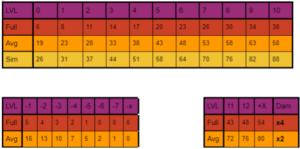Action Resolution
Assuming an activity does not use a Non-Standard (Checked) Outcome, a single Result Check determines the outcome and measure of the outcome’s success or failure, denoted by an associated Measure of Success; When all the {} adjustments have been applied to an action, the total measure is the resultant outcome. The GM adds narration to enhance the experience and expound on the results. There are many conditions which indicate a character is Lacking Capability.
Measure of Quality (MQ): The result level on which the action succeeds; There is a base level & adjustments shift the effective measure down (neg.) or up (pos.). MQ adjustments do not modify an Outcome to the point of either Disastrous or Extraordinary.
- Boosted Outcomes: Any simple becomes a Major success
- Disrupting/Demanding/Inhibiting/Dispersing/Reducing Outcome: -1 Measure
Measure of Success (MS): The target level on the resolution scale; There is a base level & adjustments shift the effective measure left (neg.) or right (pos.). Many effects have a difficulty or ease that adjust chance outcomes.
Failed Resolution Measures
- Disastrous: (Critically Failed Outcome) The worst possible outcome. The target takes full damage on a save, stumbles and may fall, or has some other calamitous outcome such as a Feeble expression.
- Dire: (Considerably Failed Outcome) The check was roughly 20% or more less than what was needed (5 or more on D20) for failure. Base damage and/or effects are maximum.
- Failure: (Failed Outcome) Either the adjusted Measure of Success is reduced below 1, or the check simply did not achieve any success. The target has nothing happen to them unless noted in the source effect/item.
Successful Resolution Measures
- Simple: ([Average] Successful Outcome; 1 Measure) The check was the minimal amount of what was needed to succeed.
- Major: ([Full] Considerably Successful Outcome; 2 Measures) The check was roughly 20% or more than what was needed (5 or more on D20) for success. Base damage and/or effects are maximum and/or GM Narration can expound on this.
- Extraordinary: (Critically Successful Outcome; 3 Measures) The best possible outcome. Base damage of individual items is double maximum and effects are maximized. On mystical abilities, damage maximum is only 50% greater than full. Critical hits on attacks can also cause Wounds and/or Fortune expression can expound on this.
i20™ Quality of Results Details
i20 Skills REPLACE d20 skill proficiency: Add the skill level + modifiers to the check ( Proficiency Bonus not used).
A single Result Check to assess Success or Failure AND quality which may be impacted by conditions which indicate a Lack of Capability (Unfamiliar, Unproficient, etc.). The GM can { } Narrate it, and players may request an appropriate impact when anything other than a basic outcome is indicated. Character Points are Rewarded by the GM to improve Skills (and other Features).
Measure of Success: Example: +1 = Adjustment to a d20 check.
Rule of Averages: Hit Points, damage and other factors use a simple/major/critical outcome scale for damage or effects, where a check determines the quality of success or failure, instead of random dice to follow up.
- Disastrous: (Critical Failure) – Example(s): A spell doing 2d10 has its save failed by 5 doing 20 damage + adjustments; a “1” on a D20 for a spell doing 2d10 does 20 x1.5 = 30 damage + adjustments.
- Simple: (Average Outcome – success by less than 5 more than the required minimum) Example: A sword doing d6 does 3 damage + adjustments.
- Major: (Full Outcome – success by 5 or more than the required minimum) Example: A sword doing d6 does 6 damage + adjustments, a spell attack does maximum damage.
- Extraordinary: (Critical Outcome – success as a “20” on a D20) Example: A sword doing d6 does 6×2=12 + adjustments.
 iCore™ Quality of Results Details
iCore™ Quality of Results Details
Measure of Success: Example: +1 = Adjustment to the Skill Level check.
- Disastrous – Equivalent to -2 Measures
- Failure” 0% Result – Equivalent to -1 Measures
- Simple: 25% Result – Equivalent to +1 Measures
- Average: 50% Result – Equivalent to +2 Measures
- Full: 100% Result – Equivalent to +3 Measures
- Extraordinary: 200% Result – Equivalent to +4 Measures
Non-Standard Checked Outcomes
Obvious Outcome: Where the result of an action is { } obvious and automatic (either success or failure) based on roleplayed aspects and/or situations. Resolving Outcomes has multiple perspectives and narrative elements to it.
Fated Outcome: Where no adjustments other than mundane proficiency and stat can be applied. Aspects of Fortune, Luck, Augury, Foresight, etc. and Reward measures cannot be used.
